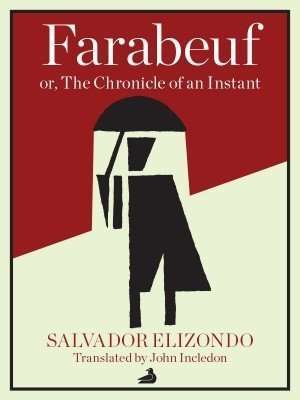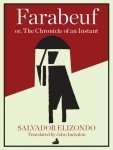FARABEUF by Salvador Elizondo, Book Review: Powerful
Farabeuf by Salvador Elizondo, or, ‘The Chronicle of an Instant’ is intensely absorbing but also deeply disturbing. A literary classic now available in English.

Farabeuf or, The Chronicle of an Instant Synopsis:
A ’60s Mexican cult masterpiece, Farabeuf is an enigmatic vision of the French surgeon L.H. Farabeuf’s curious existence, from his morbidly erotic obsessions to his life as an inventor of grisly surgical instruments, an amateur photographer, and possibly even a spy in occupied Beijing during the Boxer Rebellion. With patience and purpose, Salvador Elizondo’s sensual prose brilliantly constructs, explores, and proceeds to annihilate the boundaries between pain and pleasure, love and lust, reality and longing — between our individual and collective identities.
In many ways a Latin American response to the work being done by European writers like Alain Robbe-Grillet, Farabeuf is at once single-minded in its intensity and nearly limitless in its possible interpretations, at times shocking and savage, at others sensuous and poetic. An unsung masterpiece of Spanish-language literature, now made available again in English on the fiftieth anniversary of its original publication.
Translated from the Spanish with an introduction by John Incledon (Ox and Pigeon)
Disclosure: If you click a link in this post we may earn a small commission to help offset our running costs.
BOOK REVIEW
This literary classic Farabeuf or The Chronicle of an Instant will not be for everyone – it is intensely absorbing but also deeply disturbing.
Despite having been first published 50 years ago, Farabeuf is distinctly ‘modern‘ from a literary standpoint. Elizondo requires participation from his audience – the reader is directly engaged and becomes as much a part of the story as that described on the page. The only parallel in reader engagement for me to date is Italo Calvino’s If on a winter’s night a traveller.
In Farabeuf the burning questions the reader faces are innumerable. Is the narrator reliable? What are their intentions? What character role am I being assigned within this deeply unsettling tale?
His presence is like the imminent arrival of night. Something in his look, which seemed to probe our memory, was draining the light, leaving shadow in its place. Who is this man who takes night with him wherever he goes? His presence is like a sudden premonition of the syllables of a name that we have forgotten, quick shapeless syllables.
Literary horror
Elizondo skillfully lures in his audience, using symbolism and repetition to hypnotic effect. In this way, he prepares his reader for the gradual revelation of horrific details. The content of this novel is very much for ‘adults with strong stomachs’ only.
Immediately following the sound of the three coins striking the table, he must have opened the door and seen her from behind. Engraved on his eyes was the image of the moment, of the space where the deathly light of dusk slowly coagulated around all objects like blood flowing from an incision in a cadaver.
Full credit to John Incledon for tackling the translation of this extremely complex and nuanced work.
Elizondo Salvador’s Farabeuf is a powerful literary statement that will leave readers feeling stunned – thinking not just about their interpretation of the words they have read, but also about their feelings and personal response to having read them.
BOOK RATING: The Story 3 / 5 ; The Writing 4 / 5 — Overall 3.5

Farabeuf is available from:
Amazon | B&N | Kobobooks
Genre: Literature, Translation, Drama, Classic
This review counts towards my participation in the Back to the Classics Challenge 2015.
About the Author, Salvador Elizondo
Salvador Elizondo Alcalde (1932 – 2006) was a Mexican writer of the 60s Generation of Mexican literature.
Regarded as one of the creators of the most influential cult noirè, experimental, intelligent style literature in Latin America, he wrote as a novelist, poet, critic, playwright, and journalist. His most famous novels are Farabeuf (1965) and El hipogeo Secreto (1968). He is also known for El grafógrafo (1972) which is a series of short texts based on linguistic abbreviatory experimentation.
* My receiving a copy of this book from Ox and Pigeon for review purposes did not impact the expression of my honest opinions in the review above.
